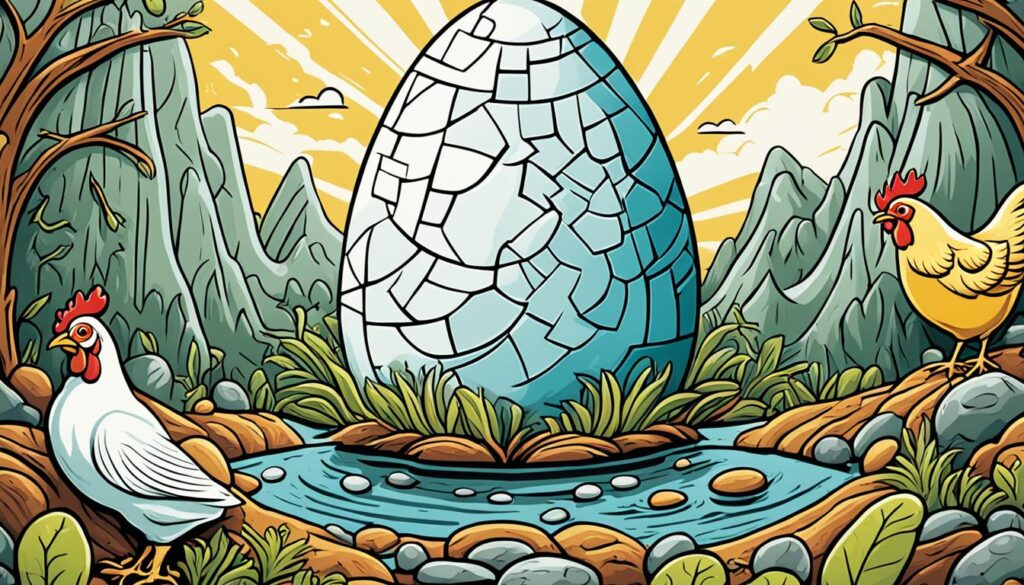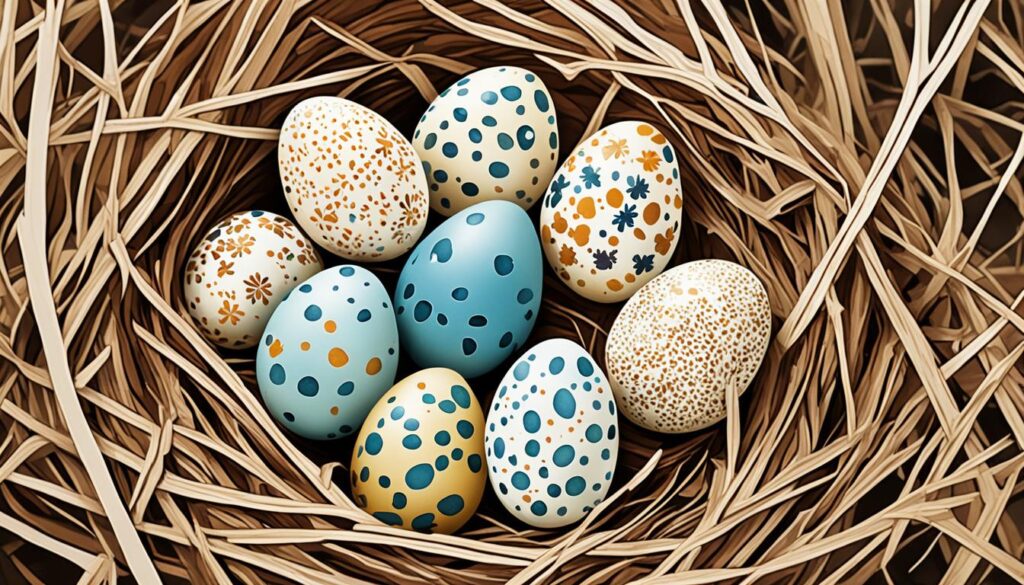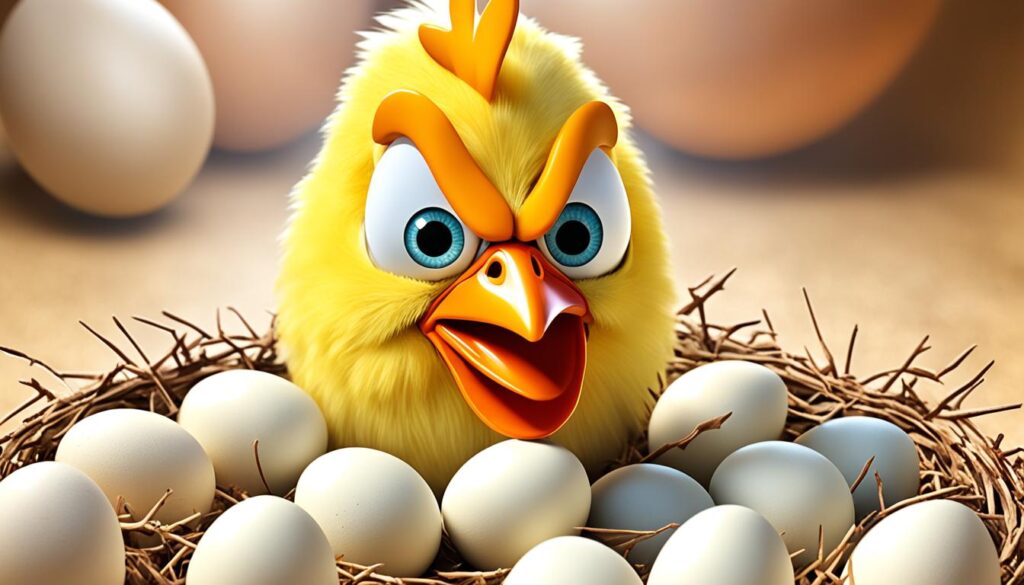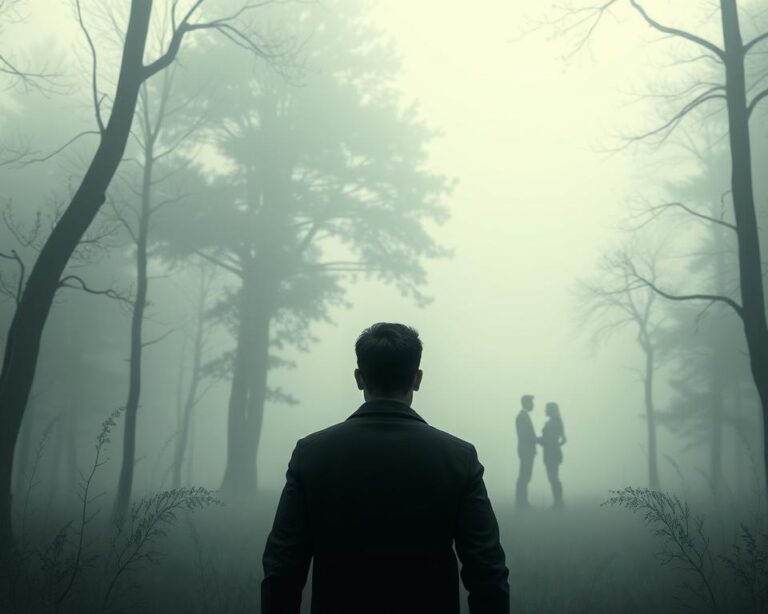Gather around, my dear readers, for I am about to embark on a journey that seeks to answer one of the most perplexing questions known to humankind. I stand before you today to explore the enigmatic puzzle that has puzzled philosophers, scientists, and deep thinkers for centuries – the timeless conundrum of the egg and chicken paradox.
Now, I know what you must be thinking. Hasn’t this question already been solved? Haven’t we moved past ancient philosophical debates? But let me challenge your beliefs and provoke your curiosity with a simple yet thought-provoking question – which came first, the egg or the chicken? Take a moment to reflect and ponder.
While modern-day discussions may dismiss this question as inconsequential, the roots of this paradox run deep, intertwined with the history of human thought. From ancient philosophers grappling with the complexities of causality to contemporary scientists unraveling the mysteries of evolution, the egg and chicken paradox persistently whispers its riddles in our ears, defying our understanding of cause and effect.
Through this article, we shall peel back the layers of this age-old mystery, delving into philosophy, history, biology, and the fascinating twists and turns that emerge from attempting to unravel the egg and chicken paradox. Prepare yourself for an intellectual adventure like no other, where ancient wisdom meets modern insights and where the answers may lie just beyond our grasp.
Key Takeaways:
- The egg and chicken paradox has intrigued philosophers and scientists for centuries
- It challenges our understanding of cause and effect and has deep roots in ancient philosophy
- Biological evolution offers clues to resolving the paradox
- The question remains relevant in modern-day discussions
- The interconnectedness of the egg and chicken symbolizes the continuous cycle of life
Unraveling the Ancient Egg and Chicken Paradox
In the fascinating realm of philosophical conundrums, the egg and chicken paradox stands as an enigma that has captivated the curious minds of scholars and thinkers throughout history. This ancient puzzle has its roots in the realm of philosophy and has sparked profound debates and contemplation over the centuries.
The Roots of the Paradox in Philosophy and History
The egg and chicken paradox finds its origins in the philosophical musings of ancient times. It represents a puzzling dilemma that questions the fundamental principles of causality and the intricate relationships between cause and effect. Philosophers have grappled with this paradox, seeking to unravel its complexities and offer explanations that can shed light on the enigma.
The quest to resolve this philosophical paradox has deep historical roots and has been a subject of contemplation for many notable thinkers throughout history. From the ancient Greeks to the modern era, the paradox has been a topic of fascination, leading to various interpretations and viewpoints.
The Metaphorical Use of the Paradox Across Ages
Beyond its philosophical implications, the egg and chicken paradox has also found metaphorical use across different ages and cultures. It has served as a symbol for complex or unresolvable questions and has been employed in literature, art, and cultural discourse to convey deeper meanings and provoke intellectual stimulation.
Metaphorical references to the paradox highlight its timeless nature and its ability to transcend philosophical boundaries. It has become a powerful tool for expression, allowing individuals to contemplate the intricacies of causality and ponder the mysterious nature of existence itself.
Aristotle and Plutarch’s Take on the Causality Dilemma
Two prominent figures in ancient philosophy, Aristotle and Plutarch, offered their perspectives on the egg and chicken paradox. Aristotle, renowned for his contributions to metaphysics and natural philosophy, suggested that the egg must have come first, considering the evolutionary process and the development of new species.
On the other hand, Plutarch, a Greek historian, proposed a different angle, emphasizing that the question itself was flawed. He argued that nature does not abide by linear causality but rather operates within a complex web of interconnections and influences.

Exploring the viewpoints of these esteemed philosophers allows us to gain insight into the age-old debate and showcases the diverse perspectives that have shaped our understanding of the paradox throughout history.
Interpreting the Conundrum Through Biological Evolution
In order to unravel the age-old egg and chicken paradox, we must turn to the fascinating field of biological evolution. Through the lens of evolutionary biology, we can gain valuable insights into the origins of the modern chicken and its relationship to the egg.
The Journey from Proto-Chicken to Modern Hen
The story begins with the existence of a creature known as the proto-chicken, a predecessor to the modern-day domestic chicken. This creature gradually, over the course of many generations, underwent genetic mutations that ultimately gave rise to what we now recognize as the chicken.

One significant aspect of this evolutionary journey is the development of eggshells. Genetic mutations led to the formation of hard, protective shells around the eggs, providing crucial protection for the developing embryo. These eggshells became a defining characteristic of the modern chicken and serve as a marker of its evolutionary history.
Scientific Insights into Eggshells and Genetic Mutations
Scientists have studied the composition of eggshells, uncovering fascinating insights about their structure and properties. The intricate network of calcium carbonate crystals provides strength and durability, ensuring the survival of the developing embryos. These scientific findings highlight the remarkable adaptability of the chicken’s genetic makeup, enabling the evolution of such complex structures as eggshells.
Evolutionary Biology’s Resolution: Ancient Eggs Predate Domestic Chickens
Through the study of evolution, a resolution to the paradox emerges. The evidence suggests that ancient eggs predate the existence of domestic chickens. In other words, the egg came first. The genetic mutations and gradual changes that occurred in the ancestral species over time ultimately resulted in the emergence of the chicken as we know it today.
By embracing the biological interpretation of the egg and chicken paradox, we gain a deeper understanding of the complex processes that have shaped life on Earth. Evolutionary biology provides a compelling resolution to this age-old conundrum, offering a fascinating glimpse into the interplay between genetic mutations, species adaptation, and the intricate balance of nature.
Egg and Chicken Paradox: A Cause and Effect Twister
The egg and chicken paradox is a cause and effect twister, challenging our understanding of causality. It is a complex puzzle that leads us into a twisted and convoluted web of reasoning. At its core, the paradox raises questions about the interplay between cause and effect, pushing us to question which came first: the egg or the chicken. But as we peel back the layers of this enigma, we find ourselves confronted with an even deeper conundrum: the concept of infinite regress.
The twisted nature of the paradox lies in its recursive logic, wherein each potential cause relies on a prior cause ad infinitum. This infinite regress prevents us from establishing a definitive answer to the question at hand. We are left spinning in a never-ending loop, as the search for the ultimate cause becomes an exercise in futility. As I delve deeper into this paradoxical labyrinth, I am confronted with the realization that the more I seek resolution, the further I am pushed into an intellectual abyss.
In an attempt to grasp the complexities of cause and effect within the egg and chicken paradox, I stumble upon a quote by the renowned philosopher Friedrich Nietzsche:
“One must take care to avoid the logical fallacy of infinite regress, for within its twisted grip, reason becomes a paradoxical impossibility.”
Nietzsche’s words strike a chord within me, encapsulating the essence of the egg and chicken paradox. The infinite regress that permeates this conundrum renders our rational minds helpless, forcing us to confront the limitations of our own understanding.
As I come to terms with the twisted nature of the paradox, I am reminded that the pursuit of knowledge and enlightenment is often marked by moments of disarray and perplexity. The egg and chicken paradox serves as a humbling reminder that our quest for answers may lead us down an infinite spiral, challenging our preconceived notions and urging us to embrace the complexities of the world around us.

Conclusion
Advances in quantum physics have revealed new insights into the age-old puzzle of the egg and chicken paradox. These groundbreaking discoveries have brought us closer to understanding the intricate relationship between cause and effect, shedding light on this captivating conundrum.
But why does the paradox continue to captivate our imaginations and remain relevant in today’s conversations? The answer lies in its profound philosophical implications. The egg and chicken paradox challenges our conventional notions of causality, forcing us to question the linear progression of events. It reminds us that sometimes, the answers we seek cannot be easily categorized into neat sequences, but rather exist in a complex web of interconnectedness.
In modern times, it is crucial to embrace the cycle of the chicken and egg, as it serves as a powerful metaphor for the continuous nature of life. Just as the chicken lays the egg, which in turn hatches into another chicken, our lives are intricately woven into an ever-evolving tapestry of interconnected experiences. Understanding and appreciating this cycle allows us to embrace the beauty of unpredictability and the endless possibilities that unfold before us.
So let us marvel at the mysteries of the egg and chicken paradox, not only as a fascinating intellectual puzzle but also as a reminder of the vastness of the universe and the wonder it holds. In a world governed by quantum uncertainties and countless interconnected possibilities, we can find solace in embracing the enigmatic dance of the chicken and the egg, for it is in this dance that we find the true essence of life itself.
FAQ
What is the egg and chicken paradox?
The egg and chicken paradox is an age-old question that explores the dilemma of which came first, the egg or the chicken. It challenges our understanding of cause and effect and has been a topic of philosophical and scientific debate for centuries.
How did the egg and chicken paradox originate?
The origins of the egg and chicken paradox can be traced back to ancient philosophy. It has been metaphorically used throughout history and has been a subject of interest for renowned philosophers like Aristotle and Plutarch.
What is the philosophical perspective on the egg and chicken paradox?
Philosophers like Aristotle and Plutarch have engaged with the paradox, exploring the intricacies of causality and the concept of infinite regress. Their perspectives shed light on the complexities of determining cause and effect in the context of the egg and chicken paradox.
How does biological evolution explain the egg and chicken paradox?
Through the lens of biological evolution, the journey from proto-chicken to modern hen provides insights into the paradox. Scientific research on eggshells and genetic mutations reveals that ancient eggs predate domestic chickens, offering a resolution to the paradox.
Why is the egg and chicken paradox a cause and effect twister?
The egg and chicken paradox challenges our understanding of causality. It highlights the concept of infinite regress, where determining a definitive cause becomes elusive. Understanding cause and effect in the context of the paradox requires delving into the complexities of the twisted nature of causality.
How does the egg and chicken paradox relate to quantum physics?
Advances in quantum physics have shed new light on the age-old puzzle of the egg and chicken paradox. Quantum physics offers a different perspective on causality and demonstrates the interconnectedness and continuous nature of life. The paradox remains relevant in modern conversations as it symbolizes the cyclical and interconnected nature of existence.

